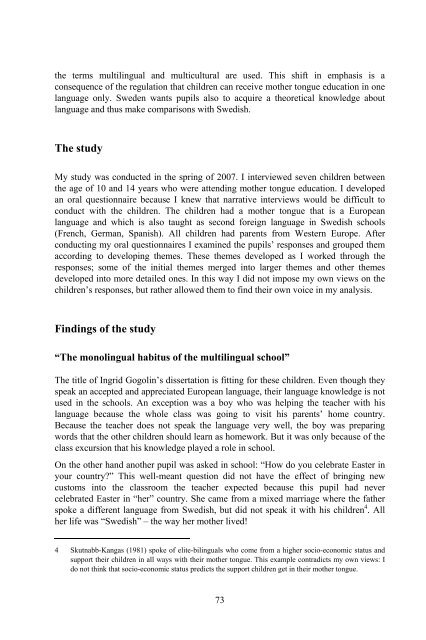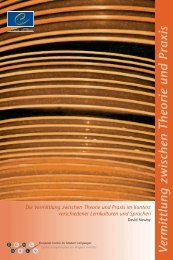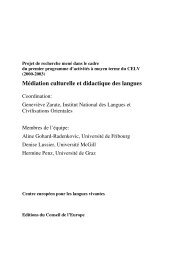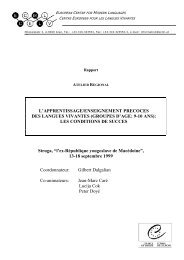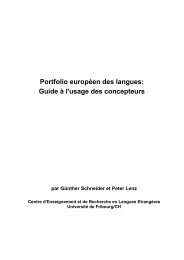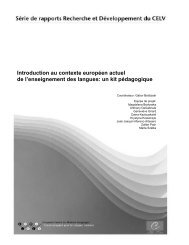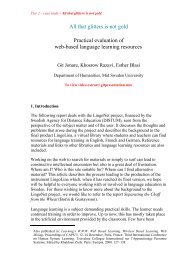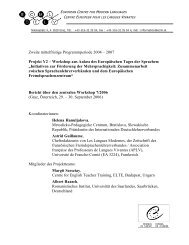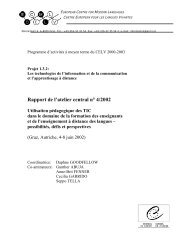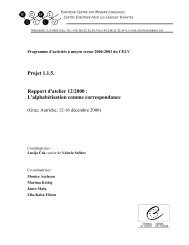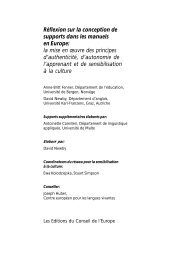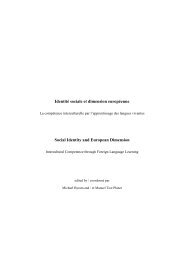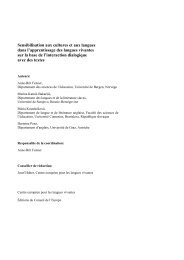cohesion - European Centre for Modern Languages
cohesion - European Centre for Modern Languages
cohesion - European Centre for Modern Languages
You also want an ePaper? Increase the reach of your titles
YUMPU automatically turns print PDFs into web optimized ePapers that Google loves.
the terms multilingual and multicultural are used. This shift in emphasis is a<br />
consequence of the regulation that children can receive mother tongue education in one<br />
language only. Sweden wants pupils also to acquire a theoretical knowledge about<br />
language and thus make comparisons with Swedish.<br />
The study<br />
My study was conducted in the spring of 2007. I interviewed seven children between<br />
the age of 10 and 14 years who were attending mother tongue education. I developed<br />
an oral questionnaire because I knew that narrative interviews would be difficult to<br />
conduct with the children. The children had a mother tongue that is a <strong>European</strong><br />
language and which is also taught as second <strong>for</strong>eign language in Swedish schools<br />
(French, German, Spanish). All children had parents from Western Europe. After<br />
conducting my oral questionnaires I examined the pupils’ responses and grouped them<br />
according to developing themes. These themes developed as I worked through the<br />
responses; some of the initial themes merged into larger themes and other themes<br />
developed into more detailed ones. In this way I did not impose my own views on the<br />
children’s responses, but rather allowed them to find their own voice in my analysis.<br />
Findings of the study<br />
“The monolingual habitus of the multilingual school”<br />
The title of Ingrid Gogolin’s dissertation is fitting <strong>for</strong> these children. Even though they<br />
speak an accepted and appreciated <strong>European</strong> language, their language knowledge is not<br />
used in the schools. An exception was a boy who was helping the teacher with his<br />
language because the whole class was going to visit his parents’ home country.<br />
Because the teacher does not speak the language very well, the boy was preparing<br />
words that the other children should learn as homework. But it was only because of the<br />
class excursion that his knowledge played a role in school.<br />
On the other hand another pupil was asked in school: “How do you celebrate Easter in<br />
your country?” This well-meant question did not have the effect of bringing new<br />
customs into the classroom the teacher expected because this pupil had never<br />
celebrated Easter in “her” country. She came from a mixed marriage where the father<br />
spoke a different language from Swedish, but did not speak it with his children 4 . All<br />
her life was “Swedish” – the way her mother lived!<br />
4 Skutnabb-Kangas (1981) spoke of elite-bilinguals who come from a higher socio-economic status and<br />
support their children in all ways with their mother tongue. This example contradicts my own views: I<br />
do not think that socio-economic status predicts the support children get in their mother tongue.<br />
73


